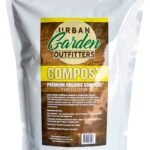Introduction to Organic Vegetable Gardening for Beginners
Welcome to our guide on organic vegetable gardening. We believe that the benefits of growing your own fresh produce extend far beyond just the economy and convenience of it all. By embracing organic gardening, you can lead a healthier lifestyle, while also doing your part for the environment.
Organic vegetable gardening is not only a fun and rewarding hobby but also a way to connect with nature and provide yourself and your family with fresh, nutritious food.
Key Takeaways: Growing Organically Using Sources of Organic Matter
- Organic vegetable gardening is a great way to lead a healthy lifestyle and do your part for the environment.
- Growing your own fresh produce can provide you and your family with nutritious food and help you save money.
- Embracing organic gardening can be a fun and rewarding hobby that allows you to connect with nature.
- Organic vegetable gardening involves using natural methods to grow vegetables without the use of harmful chemicals or pesticides.
- With the right techniques and practices, anyone can become a successful organic vegetable gardener.
Read More OutdoorGoodness Articles:
Embrace Organic Gardening: What Is Organic Vegetable Gardening?
At its core, a vegetable garden is a plot of land dedicated to growing vegetables for personal use. An organic garden, on the other hand, is a plot of land that prioritizes soil health, natural pest control, and biodiversity to grow healthy plants without relying on synthetic chemicals.
Organic vegetable gardening is the practice of growing vegetables in an organic garden, using only natural methods to maintain plant health.
Why is organic vegetable gardening important?
The use of synthetic chemicals in modern agriculture has raised concerns about the safety of our food, health, and the environment. By embracing organic vegetable gardening, we can take control of the quality of our produce and promote a safer, healthier environment for ourselves and future generations.
Key ingredients of organic vegetable gardening: organic matter and compost
Organic matter is the foundation of healthy soil and is essential for successful organic vegetable gardening. Compost, a mixture of organic matter and decomposed plant material, is an excellent source of plant nutrients and helps retain moisture in the soil. Incorporating organic matter and compost into your garden soil builds a healthy growing environment for your plants and supports a diverse ecosystem of beneficial organisms.
As you embark on your organic vegetable gardening journey, remember to prioritize soil health and use natural methods to maintain your garden’s balance. Happy gardening!
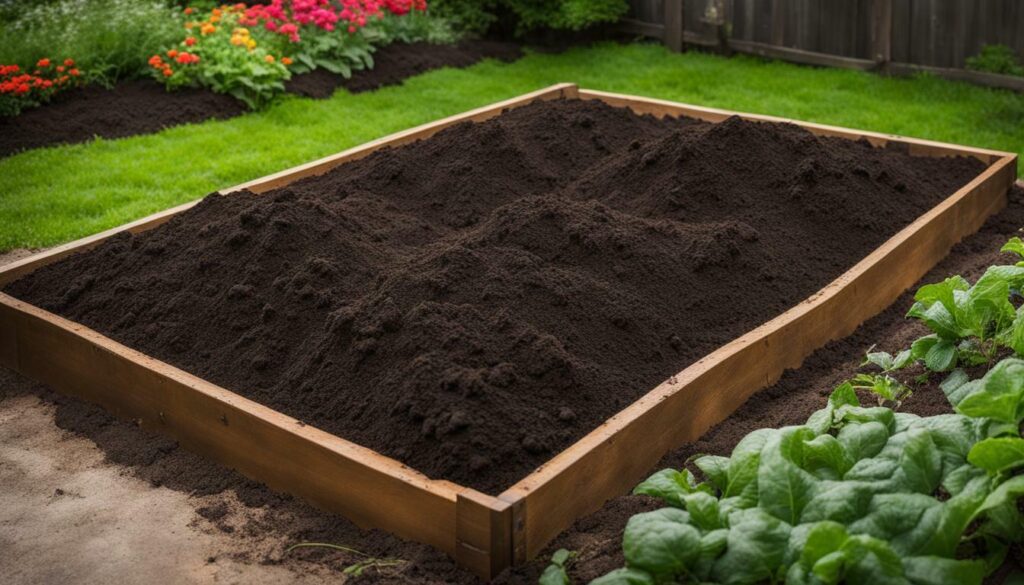
Becoming an Organic Gardener: Essential Techniques and Practices
As organic gardeners, we understand the importance of cultivating healthy plants without harming the environment or ourselves. Whether you are a novice or an experienced gardener, there are several essential techniques and practices to keep in mind when growing your organic vegetable garden.
Weed Control
Gardening is a labor of love, and one of the most time-consuming aspects is weed control. To minimize the growth of weeds, we recommend hand-pulling or hoeing around plants instead of using chemical sprays. This technique not only saves time and money but also keeps your plants free from harmful chemicals.
Organic Fertilizers
Using organic fertilizers is a great way to enhance the growth of your plants while also boosting soil health. Compost, manure, and bone meal are some of the best organic fertilizers that provide the necessary nutrients for plant growth. One can turn yard waste, fruit scraps, and other organic matter into nutrient-dense compost by creating a compost pile.
Providing Essential Nutrients to Plants
In addition to using organic fertilizers, it is essential to understand the nutrient requirements of each plant. Plants have specific needs, and using a balanced formulation of key nutrients will help your plants thrive. Soil tests can determine nutrient deficiencies and help you choose the appropriate organic fertilizers for your garden.
Natural Pest Control Methods
Garden pests can wreak havoc on your plants and lead to decreased yields. Instead of using harmful chemicals, consider natural pest control methods such as planting native plants to attract beneficial insects, using row covers, and handpicking pests. These techniques provide effective pest control without damaging the environment or harming beneficial insects.
As organic gardeners, we understand the importance of nurturing our plants and the soil to create a sustainable and healthy garden. By following these essential techniques and practices, we can maintain a thriving organic garden while also minimizing our impact on the environment.

Step by Step Instructions on How to Start an Organic Vegetable Garden Using Organic Seeds
Here’s a detailed step-by-step list on how to start an organic vegetable garden:
Planning Phase
- Research and Decide What to Grow:
- Research the types of vegetables that grow well in your climate and soil type.
- Consider your family’s eating habits and preferences when selecting vegetables.
- Make a list of vegetables you’d like to grow, keeping in mind their growing seasons.
- Select a Location:
- Choose a location that receives at least 6-8 hours of direct sunlight each day.
- Ensure the area has good drainage to prevent waterlogged soil.
- Keep the garden close to a water source for easier watering.
- Sketch a Garden Plan:
- Draw a rough sketch of your garden layout, marking where each vegetable will be planted.
- Consider companion planting to maximize space and deter pests.
- Make sure to leave enough space between plants for air circulation and growth.
- Budget and Resources:
- Create a budget that includes the cost of organic seeds, soil amendments, and tools.
- Make a checklist of materials and tools you’ll need.
- Consider sourcing some materials like compost and mulch locally to save money.
Preparation Phase
- Soil Testing:
- Purchase a soil testing kit or take a soil sample to a local agricultural extension office.
- Test for pH levels, and nutrient content like nitrogen, phosphorus, and potassium.
- Use the results to determine what soil amendments are needed.
- Soil Preparation:
- Loosen the soil using a shovel or tiller to a depth of at least 12 inches.
- Add organic matter like compost or well-rotted manure to enrich the soil.
- Mix the amendments thoroughly into the soil for even distribution.
- Purchase Seeds and Plants:
- Buy organic seeds or seedlings from reputable sources to ensure quality.
- Check the expiration date on seed packets and look for disease-resistant varieties.
- Store seeds in a cool, dry place until you’re ready to plant.
- Gather Tools:
- Basic tools include a shovel, hoe, rake, and watering can.
- Consider additional tools like pruners, gloves, and a wheelbarrow for convenience.
- Keep your tools clean and sharp for effective use.
Planting Phase
- Prepare Garden Beds or Containers:
- Remove any weeds, rocks, or debris from the planting area.
- Loosen the soil and level the surface using a rake.
- If using containers, ensure they have drainage holes and are filled with organic potting soil.
- Planting:
- Follow the instructions on the seed packets or plant tags for proper planting depth and spacing.
- Use a ruler or measuring tape to ensure accurate spacing between plants.
- Cover the seeds lightly with soil and pat down gently to ensure good soil contact.
- Watering:
- Water the newly planted seeds or seedlings immediately to help settle the soil.
- Use a gentle spray to avoid disturbing the soil or seeds.
- Keep the soil consistently moist, especially during the germination phase.
Maintenance Phase
- Mulching:
- Apply a 2-3 inch layer of organic mulch like straw or wood chips around the plants.
- Mulch helps to conserve soil moisture and suppress weed growth.
- Avoid piling mulch against the stems of plants to prevent rot.
- Watering:
- Water the plants deeply and less frequently to encourage root growth.
- Use a soaker hose or drip irrigation system for efficient watering.
- Water early in the morning or late in the afternoon to minimize water loss due to evaporation.
- Fertilizing:
- Use organic fertilizers like compost tea, fish emulsion, or bone meal as needed.
- Follow the instructions on the fertilizer package for application rates and timing.
- Avoid over-fertilizing, as this can lead to excessive foliage and fewer fruits.
- Pest and Disease Management:
- Monitor plants regularly for signs of pests or diseases.
- Use organic methods like neem oil, insecticidal soap, or introducing beneficial insects for control.
- Remove and dispose of diseased plants to prevent the spread of infection.
Harvesting Phase
- Monitor for Ripeness:
- Check vegetables regularly for signs of ripeness, such as color, size, and texture.
- Use your senses like touch and smell to determine if a vegetable is ready for harvest.
- Some vegetables, like zucchini and cucumbers, are best harvested when young and tender.
- Harvesting:
- Use clean, sharp tools like scissors or pruners to harvest vegetables.
- Harvest in the cool of the morning or late afternoon to maintain freshness.
- Handle the produce gently to avoid bruising or damaging the vegetables.
- Storage:
- Store harvested vegetables in a cool, dry place like a cellar or refrigerator.
- Use proper storage containers like mesh bags or perforated plastic bags to maintain freshness.
- Label and date the produce to keep track of shelf life.
End-of-Season
- Cleanup:
- Remove all spent plants and compost what’s not diseased.
- Clean and store your tools properly to prolong their lifespan.
- Dispose of any leftover chemicals or fertilizers according to local regulations.
- Soil Replenishment:
- Add more compost or organic matter to replenish the soil’s nutrients.
- Consider planting cover crops like clover or rye to improve soil structure.
- Test the soil again to assess its condition for the next growing season.
- Reflect and Plan for Next Year:
- Take notes on what worked well and what didn’t for future reference.
- Consider rotating crops to prevent soil depletion and disease build-up.
- Start planning for the next season by researching new varieties and techniques.
I hope this detailed guide helps you in starting and maintaining a successful organic vegetable garden!
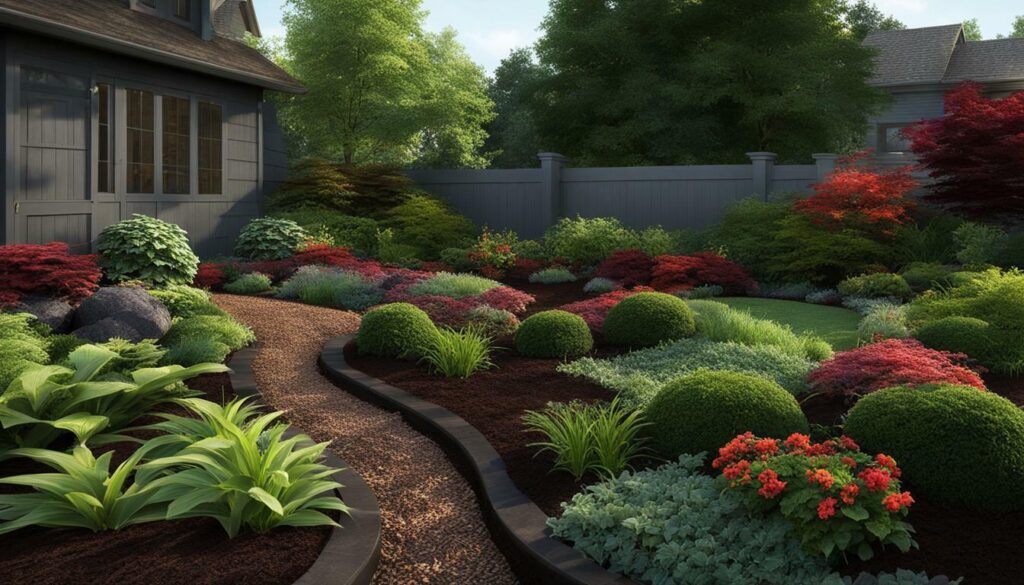
Building Healthy Soil: Organic Matter and Nutrients Using Organic Fertilizers
One of the most critical components of successful organic vegetable gardening is building healthy soil. The quality of your garden soil directly affects the growth and yield of your crops. We highly recommend using organic matter and a combination of natural sources, such as compost, to create optimal soil conditions for your plants.
Organic matter refers to decomposed plant and animal materials that help enrich soil nutrients and support the growth of microorganisms. Our top pick for organic matter is mulch, which protects the soil from excessive sun exposure, prevents erosion, and conserves moisture.
Before adding mulch, ensure that your garden soil is properly prepared by conducting a soil test. A soil test helps you determine the pH level and nutrient content of your soil and ensures that you apply the correct amount of organic matter and fertilizers.
When it comes to organic fertilizers, we recommend using a natural approach that delivers essential nutrients to the soil. By applying organic fertilizers that release slowly over time, you can provide your plants with the nutrients they need without the risk of over-fertilizing.
| Organic Matter | Advantages |
|---|---|
| Mulch | Protects soil from sun and erosion, conserves moisture |
| Compost | Enriches soil nutrients, supports microorganisms |
In summary, organic vegetable gardening starts and finishes with soil health. Mulch and compost are effective ways to enhance soil quality, and a soil test helps ensure that you apply the appropriate amount of these organic matter sources and organic fertilizers. A focus on soil health will ultimately lead to a bountiful and successful organic vegetable garden.
Protecting Your Crops: Managing Pests, Weeds and Diseases Organically
One of the most significant challenges in organic vegetable gardening is protecting your crops from pests and diseases without using harmful chemicals. Fortunately, there are organic methods that can be used to manage pests and diseases in your garden.
One effective technique for protecting your crops is using row covers. Row covers are physical barriers that can be placed over your crops to prevent pests, such as insects and birds, from getting to them. They are made from lightweight, breathable materials, and can be removed when the plants begin to flower.
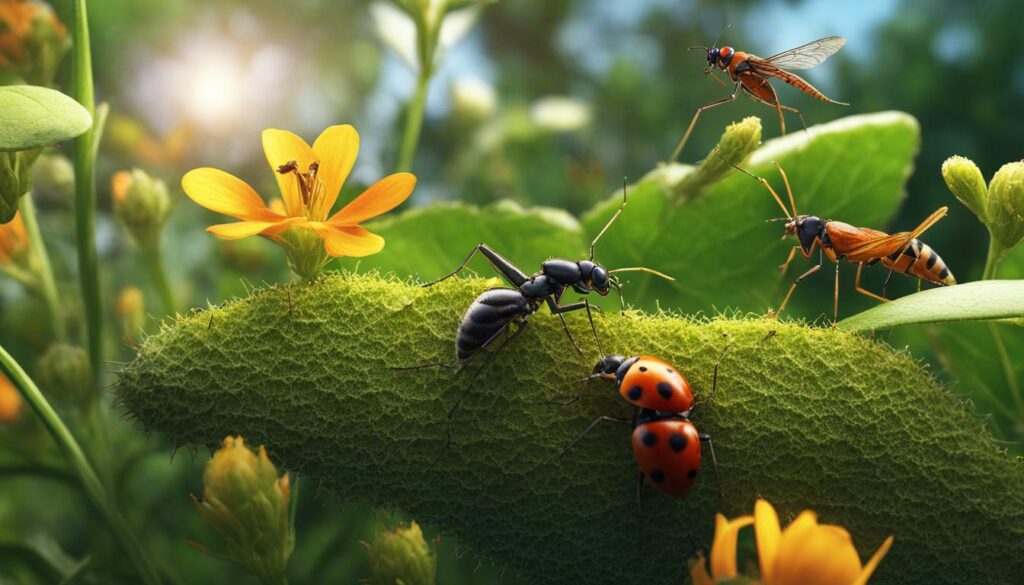
Another technique is to attract beneficial insects to your garden. Beneficial insects, such as ladybugs and lacewings, are natural predators that can help control pest populations. To attract these insects, plant flowers and herbs, such as marigolds and dill, around your garden.
Finally, organic pesticides can be used as a last resort. These herbicides are made from natural ingredients and are much less harmful to the environment than chemical pesticides. Some examples include neem oil and pyrethrin.
Using these organic methods to manage pests and diseases in your garden will not only protect your crops but also maintain a healthy environment for you and the surrounding ecosystem.
Maximizing Yield: Harvesting and Maintaining Vegetable Crops
As we move through the growing season, it’s essential to maximize the yield of our vegetable crops. One way to accomplish this is through crop rotation. By rotating crops each season, we can avoid depleting the soil of specific nutrients and reduce the likelihood of pests and diseases.
In a small garden space, it’s important to plan accordingly and get the most out of every square foot. Consider planting a variety of crops that have different growth rates, allowing for multiple harvests throughout the season. Additionally, timing is crucial. Keep a calendar of when each crop should be planted and harvested to ensure you’re getting the most yield possible.
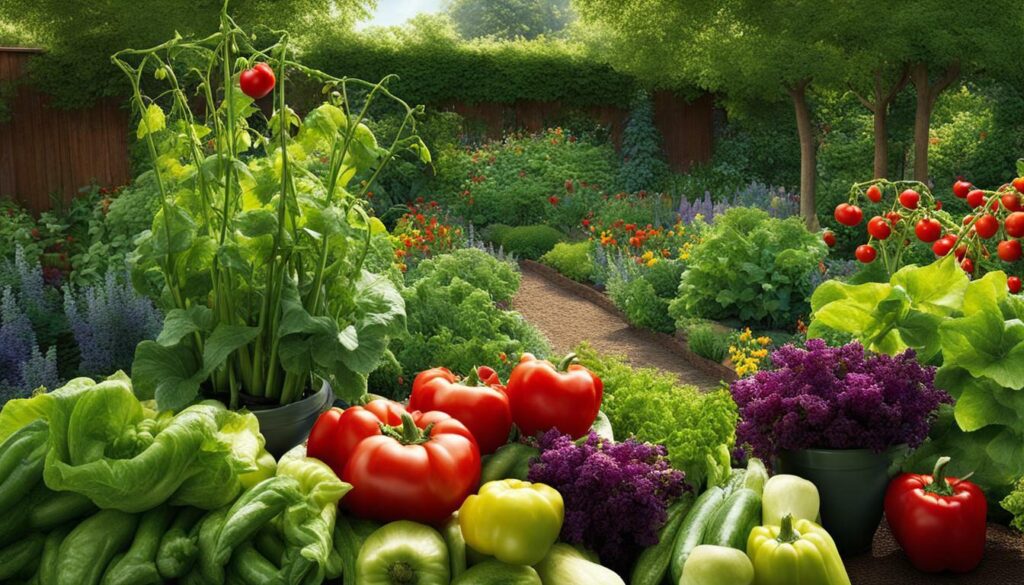
When it comes time to harvest, be sure to do it correctly. For crops like tomatoes and peppers, gently twist the fruit to remove it from the plant. For leafy greens and herbs, use scissors or shears to snip them off at the base. Always harvest in the morning when the plants are hydrated and the temperatures are cooler. This ensures that your produce will be at its freshest and most flavorful.
Finally, maintaining your vegetable crops through proper watering, weeding, and feeding is essential for maximizing yield. Water deeply and regularly, being careful not to get the leaves wet to prevent disease. Weed regularly to prevent competition for nutrients and space. And provide your plants with organic fertilizers to ensure they have the proper nutrients to grow strong and produce abundant yields.
Nurturing Healthy Plants: Soil Fertility and Nutrient Management
At the heart of organic vegetable gardening lies the principle of nurturing healthy plants through the use of healthy organic soil by adding organic matter to the soil such as, compost piles, organic matter, and nutrients. By taking the time to create an optimal growing environment for your plants, you’ll not only enjoy bountiful harvests but also ensure the long-term health of your garden.
Compost and Manure are an excellent source of organic matter. Organic matter in decline is low in organic matter.
The foundation of healthy plants is healthy soil. Creating a compost pile is one of the best ways to improve soil quality. Organic matter added to soil through composting provides essential nutrients that plants need to grow and thrive. Over time, organic matter and nutrients break down and release nitrogen, phosphorus, and potassium, which are essential to plant growth.
It is important to keep a balanced ratio of organic matter in the soil. Excess organic matter can cause plants to struggle to get the necessary levels of sunlight, water, and nutrients. Conversely, too little organic matter can lead to soil that is too compact, causing root growth to be stunted.
Adding nutrients to soil is also crucial, as it helps plants grow and resist pests and diseases. Nutrients can be added to the soil in the form of organic fertilizers, such as fish emulsion or bone meal. A soil test can help determine nutrient deficiencies and the right kind of organic fertilizer to use.
| Technique | Description |
|---|---|
| Composting | Creating a compost pile is one of the best ways to improve soil quality. Organic matter added to soil through composting provides essential nutrients that plants need to grow and thrive. |
| Organic Matter | It is important to keep a balanced ratio of organic matter in the soil. |
| Organic Fertilizers | Nutrients can be added to the soil in the form of organic fertilizers, such as fish emulsion or bone meal. |
Overall, the key to nurturing healthy plants is to create and maintain healthy soil. By regularly adding organic matter and nutrients to your garden and keeping a balanced ratio of both, you’ll ensure your plants grow strong and healthy.
Healthy soil rich in organic matter and nutrients is key for growing thriving plants.

Getting Started: Organic Vegetable Gardening for Beginners
If you’re new to gardening, don’t worry! Organic vegetable gardening is a great way to start your journey towards a healthy lifestyle. By growing your own produce in an organic garden, you can enjoy the freshest, most nutrient-rich fruits and veggies all season long.
But where do you begin? First, select a location that receives plenty of sunlight and has well-draining soil. Next, prepare the soil by adding organic matter such as compost or aged manure. This will help loosen the soil and provide essential nutrients for your plants.
When it comes to maintaining your garden, organic mulch is a valuable tool for controlling weeds and retaining moisture. Consider using materials such as straw, leaves, or grass clippings as a natural mulch. It’s also important to add organic matter to your garden throughout the growing season to ensure optimal plant growth.
Remember, starting an organic vegetable garden is a learning process and requires patience and dedication. But with a little effort and know-how, you can reap the rewards of a bountiful harvest and a healthier lifestyle. So why not give it a try?
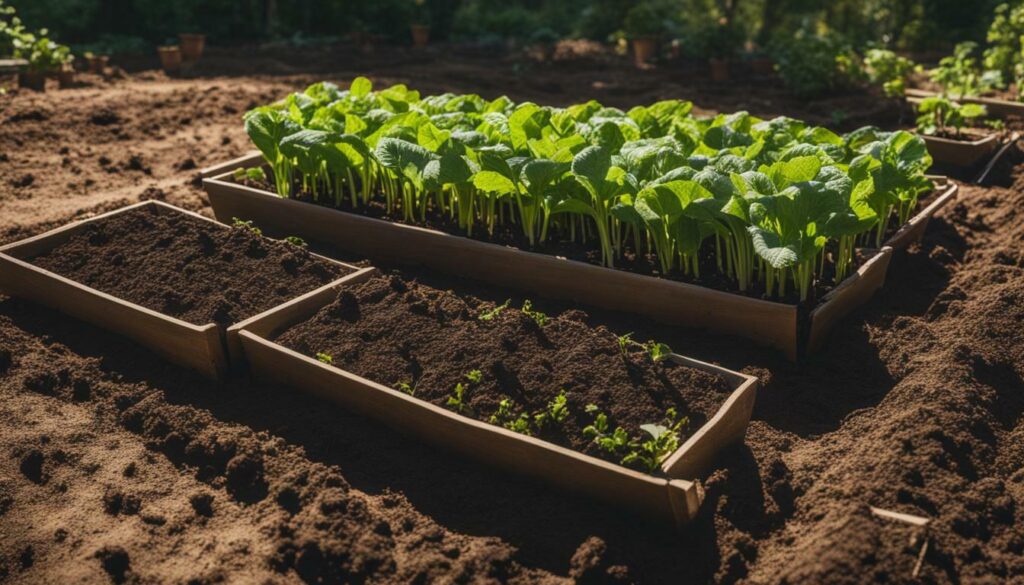
“The greatest gift of the garden is the restoration of the five senses.”
-Hanna Rion
Growing Beyond: Advanced Techniques in Organic Vegetable Gardening
As we take our organic vegetable gardening skills to the next level, we can learn a lot from the techniques employed by organic farmers. These experts grow a wide variety of garden plants using the principles of organic agriculture, and we can follow in their footsteps to achieve similar success.
When considering our garden plants, it’s essential to choose a diverse range that provides a mix of different tastes, textures, and colors. We can experiment with heirloom and unusual varieties to add interest to our vegetable garden. Additionally, we can utilize companion planting to create symbiotic relationships between different plants, enhancing growth and repelling pests.
Organic farmers also employ crop rotation to prevent soilborne diseases and improve soil fertility. By rotating our crops, we can avoid the buildup of pests and disease pathogens that can harm our plants. Additionally, we can turn to cover cropping during the off-season to improve soil structure, suppress weeds, and provide valuable organic matter for our soil.
To take things further, we can explore the principles of organic agriculture and apply them to our gardening practices. Organic agriculture seeks to minimize our impact on the environment by preserving and enhancing biodiversity, reducing chemical inputs, and promoting sustainable farming practices. By embracing these principles, we can create a self-sustaining organic vegetable garden that not only benefits us but also our wider ecosystem.
“The ultimate goal of farming is not the growing of crops, but the cultivation and perfection of human beings.” – Masanobu Fukuoka
Let’s embrace advanced techniques in organic vegetable gardening and grow beyond our current knowledge. By adopting the practices of organic farmers, choosing a diverse range of garden plants, employing crop rotation, and embracing the principles of organic agriculture, we can achieve even greater success in our gardening ventures.
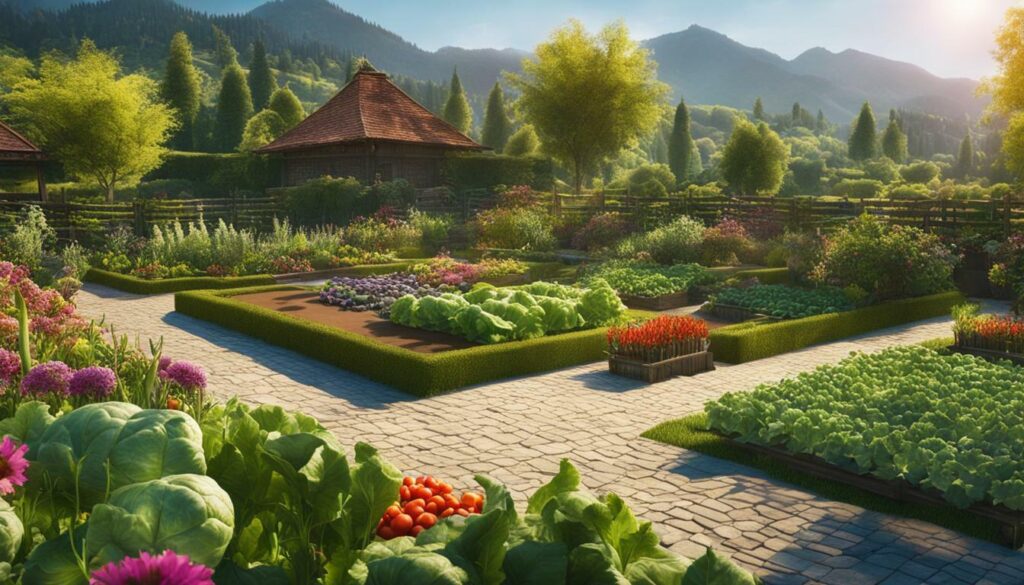
Conclusion
So there you have it – all you need to know to become a master organic vegetable gardener! By following the techniques and practices we’ve outlined, you’ll be able to nurture healthy plants and create a thriving garden filled with fresh produce.
But beyond the delicious harvests and beautiful blooms, organic gardening offers so much more. It’s an opportunity to connect with the earth, reduce your carbon footprint, and lead a healthier, more sustainable lifestyle. By embracing organic gardening, you can make a positive impact on both your own well-being and the environment around you.
So let’s get started! Whether you’re a seasoned gardener or a complete beginner, there’s no better time to dive into the world of organic vegetable gardening. Let’s roll up our sleeves, grab our trowels, and start growing a greener world together.
FAQ
Q: What is organic vegetable gardening?
A: Organic vegetable gardening is a method of growing vegetables without the use of synthetic fertilizers, herbicides, or genetically modified organisms (GMOs). It focuses on using natural and sustainable practices to nourish the soil, promote plant health, and protect the environment.
Q: Why should I embrace organic gardening?
A: As a home gardener, embracing organic gardening allows you to have control over the quality and safety of the food you consume. By avoiding harmful chemicals and artificial additives, you can enjoy fresh and healthy produce that is free from potentially harmful residues. Additionally, organic gardening promotes biodiversity, protects soil health, and reduces environmental pollution.
Q: How do I start and grow an organic vegetable garden?
A: To start an organic vegetable garden, begin by selecting a suitable location that receives ample sunlight. Prepare the soil by removing any weeds or debris and adding organic matter, such as compost or aged manure. Choose organic seeds or seedlings and plant them according to the specific requirements of each vegetable. Water regularly, practice weed control, and provide natural pest management strategies to ensure the success of your organic garden.
Q: What are some essential techniques and practices for organic gardening?
A: Essential techniques and practices for organic gardening include weed control methods, organic fertilization using compost or natural amendments, ensuring proper nutrient balance, and implementing natural pest control strategies. It is also important to practice crop rotation, companion planting, raised beds, and proper watering techniques to maintain the health of your organic garden.
Q: How can I manage pests and diseases organically in my vegetable garden?
A: Organic methods of managing pests and diseases in your vegetable garden include using row covers to protect plants, encouraging beneficial insects that prey on pests, and employing organic pesticide alternatives such as neem oil or insecticidal soap. Regular monitoring and early detection of pests or diseases will also help you take timely action to prevent significant damage to your crops.
Q: How can I maximize the yield of my organic vegetable garden?
A: To maximize the yield of your organic vegetable garden, it is essential to understand the growing season in your region and choose appropriate varieties accordingly. Implementing crop rotation strategies can help prevent soil nutrient depletion and control pests. Regular harvesting and proper maintenance, such as pruning and staking, will also contribute to increased yields. In small garden spaces, vertical gardening techniques and intercropping can be beneficial.
Q: How can I nurture healthy plants through soil fertility and nutrient management?
A: Nurturing healthy plants in your organic vegetable garden involves maintaining optimal soil fertility. You can achieve this by creating a compost pile using kitchen scraps, yard waste, and other organic materials. Adding organic matter to your soil and using natural amendments, such as bone meal or kelp meal, will provide essential nutrients. Regular soil testing can help you monitor nutrient levels and adjust accordingly.
Q: What are some tips for beginners starting with organic vegetable gardening?
A: For beginners starting with organic vegetable gardening, it is important to select a suitable location with access to sunlight. Prepare the soil by removing weeds and adding organic matter, such as compost or aged manure. Choose organic seeds or seedlings and follow instructions for planting and caring for each vegetable. Using organic mulch and practicing proper watering techniques will aid in weed control and soil moisture retention.
Q: Are there advanced techniques in organic vegetable gardening?
A: Yes, organic vegetable gardening offers a wide range of advanced techniques for experienced gardeners. These include implementing permaculture principles, utilizing advanced irrigation systems, practicing seed saving and propagation, and exploring niche gardening techniques such as vertical gardening or hydroponics. Additionally, organic farmers often employ advanced crop rotation strategies and sustainable farming practices to optimize their yield and minimize environmental impact.

Meet Kevin Goodell, your outdoor adventure coach! With a passion for nature ignited in childhood, Kevin brings a wealth of experience and expertise to simplify tough outdoor skills. As a U.S. Army veteran and former Sergeant, he has honed his leadership and teamwork abilities while developing a deep love for the great outdoors.
Kevin’s dedication to outdoor activities spans biking, birdwatching, national park trips, and archery/golf. With his friendly and approachable demeanor, he is committed to guiding individuals of all ages and skill levels towards unforgettable outdoor experiences.
Harnessing his extensive knowledge and personal achievements, Kevin is your go-to resource for learning and enjoying various outdoor pursuits. Whether you seek thrilling adventures or serene nature escapes, Kevin’s professional yet friendly approach will ensure an engaging and informative experience. Embark on your next outdoor adventure with Kevin Goodell and embrace the beauty of nature like never before.






